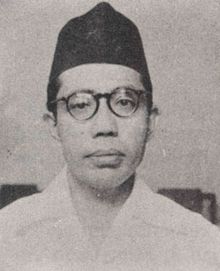Mohammed Natsir
| Mohammad Natsir | |
|---|---|
 |
|
| 5th Prime Minister of Indonesia | |
|
In office 5 September 1950 – 26 April 1951 |
|
| President | Sukarno |
| Preceded by |
Mohammad Hatta Abdul Halim |
| Succeeded by | Soekiman Wirjosandjojo |
| 2nd Minister for Communications and Information of the Republic of Indonesia | |
|
In office 12 March 1946 – 26 June 1947 |
|
| President | Sukarno |
| Preceded by | Amir Sjarifuddin |
| Succeeded by | Setiadi |
|
In office 29 January 1948 – 4 August 1949 |
|
| President | Sukarno |
| Preceded by | Sjahbudin Latif |
| Succeeded by | Sjafruddin Prawiranegara |
| Personal details | |
| Born |
17 July 1908 Alahan Pandjang, Dutch East Indies |
| Died | 6 February 1993 (aged 84) Jakarta, Indonesia |
| Nationality | Indonesian |
| Political party | Masyumi Party |
| Profession | Politician |
Mohammad Natsir (17 July 1908 – 6 February 1993) was an Islamic scholar and politician. He was Indonesia's fifth prime minister.
After moving to Bandung from his hometown Solok, West Sumatra for senior high school, Natsir studied Islamic doctrine extensively. His first articles were published in 1929, and during the 1930s he wrote for several Islamic-themed papers. He entered politics in the mid-1930s, rising through the ranks of Islamic parties. On 5 September 1950, he was chosen as prime minister, a term which he served until 26 April 1951. After his term as prime minister, he became increasingly vocal about Islam's role in Indonesia and was eventually arrested for doing so. Released in 1966 after the New Order government took power, Natsir continued to be critical of the government, eventually leading to him being banned from traveling.
Natsir wrote extensively on Islam, totaling 45 books and hundreds of articles. He viewed Islam as an intrinsic part of Indonesian culture and was disappointed by the Sukarno and Suharto governments' handling of the religion. He was given three honorary doctorates during his lifetime, one from Lebanon and two from Malaysia. On 10 November 2008, Natsir was honoured as a national hero of Indonesia.
Natsir was born in Solok, West Sumatra on 17 July 1908. His parents were Mohammad Idris Sutan Saripado, a government employee, and Khadijah. In 1916, he studied at HIS (Hollandsch-Inlandsche School) Adabiyah, Padang. After a few months, he moved to HIS Solok, studying there by day and at the Madrasah Diniyah by night. Three years later, he moved to HIS Padang together with his older sister. In 1923, he continued his studies at MULO (Meer Uitgebreid Lager Onderwijs) and he joined Pandu Nationale Islamietische Pavinderij and Jong Islamieten Bond. He also learned to play violin.
After graduating he moved to Bandung, where he studied at an AMS (Algememe Midelbare School, or senior high school). Natsir later said that he had chosen the school for its Western classics class. From 1928 until 1932, he became a chairman of JIB Bandung. He then received a teaching permit after studying for two years at a native teacher's training college. Although he had previously studied Islam in West Sumatra, while in Bandung he took a deeper interest in the religion, including subjects such as the interpretation of the Quran, Islamic jurisprudence, and dialectics; he later studied under Ahmad Hassan, the leader of Persatuan Islam.
...
Wikipedia
